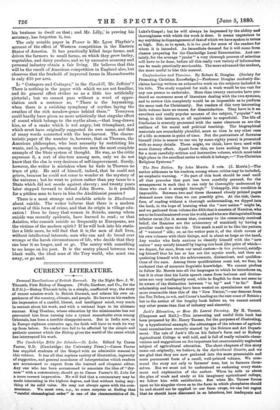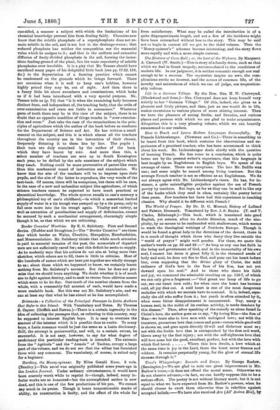Tack's Education, or How He Learnt Farming. By H. Tanner.
(Chapman and Hall.)—This interesting and useful little book has been prepared by Mr. Henry Tanner, for the purposes of illustrating, by a hypothetical example, the advantages of the scheme of agricuk tural examinations recently started by the Science and Art Depart- ment. The tale of Jack's life on his father's farm and at Rodney Agricultural College is well told, and is full of really valuable obser- vations and suggestions on the important but unaccountably neglected subject of agricultural education. The short chapters of this story came out originally, we believe, in the Agricultural Gazette, and we are glad that they are now gathered into the more presentable and more permanent form of a small, well-printed volume. We com- mend the story not only to farmers' sons, but to farmers them- selves. But we must not be understood as endorsing every state- ment and explanation of the author. When he tells us about the plan of work and study at his imaginary agricultural college, we follow him with satisfaction. But when Mr. Tanner forces upon us his singular views as to the form in which phosphates should be and should not be applied to our farm crops, we can but regret that he should have discussed in so laborione, but inadequate and One-sided, a manner a subject with which the limitations of his chemical knowledge prevent him from dealing fairly. Chemists now know that the soluble phosphate of a superphosphate does not re- main soluble in the soil, and is not lost in the drainage-water; that reduced phosphate has neither the composition nor the manurial Value which he assigns to it; and that in the uniform and extensive diffusion of finely-divided phosphate in the soil, forming the imme- diate feeding-ground of the plant, lies the main superiority of soluble phosphates over insoluble. It is a pity that Mr. Tanner should have sacrificed many pages of his delightful little book (see pp. 17-22, 118, ac.) to the depreciation of a farming practice which cannot be condemned on the grounds which he brings forward. There are occasions when it is well to keep one's hobbies, however highly prized they may be, out of sight. And then there is a funny little bit about examiners and examinations, which looks EIS if it had been introduced with a very special purpose. Mr. Tanner tells us (p. 74) that "it is when the examining body becomes distinct from, and independent of, the teaching body, that the evils of Over-examination and cram are liable to commence." Whatever germ of truth there may be in this view of the subject, there is no doubt that an opposite condition of things results in " over-examina- tion and cram." just take the case of the examinations in the prin- ciples of agriculture which the author of the book before us conducts for the Department of Science and Art. He has written a small manual on the subject, and this it is which almost all the teachers throughout the country use in the instruction of their classes, frequently dictating it to them line by line. The pupils i their turn are duly examined by the author of the book which they have learnt by rote. And more than this, a Select number of teachers are sent up to South Kensington each year, to be drilled by the sole examiner of the subject which they teach. Nothing could be more provocative of parrot-like cram than this mechanical round of instruction and examination. We know that the aim of the teachers will be to impress upon their pupils, and the aim of the latter to reproduce, the very words of the text-book. Of course, there will be exceptions, but these will be rare, in the case of a new and unfamiliar subject like agriculture, of which Science teachers cannot be expected to have much practical or theoretical knowledge. The whole system recalls to one's memory a philosophical toy of one's childhood,—in which a somewhat limited supply of water in a tin trough was pumped up by a tin pump, only to fall once more into the tin trough again. Vitality and variety, as well as correction of peculiarities and supply of deficiencies, cannot be secured by such a mechanical arrangement, charmingly simple though it be, as that which we are criticising.



































 Previous page
Previous page